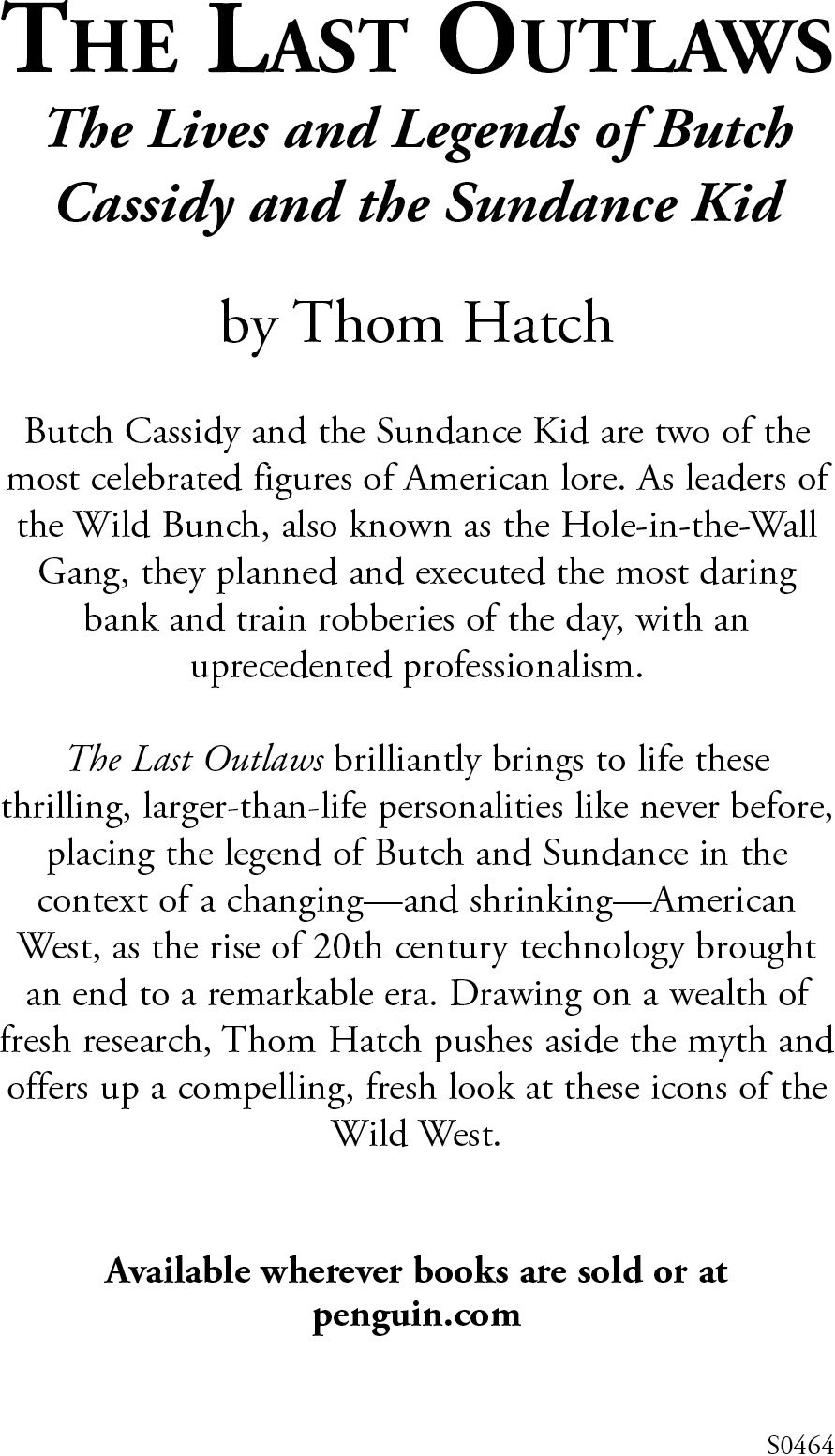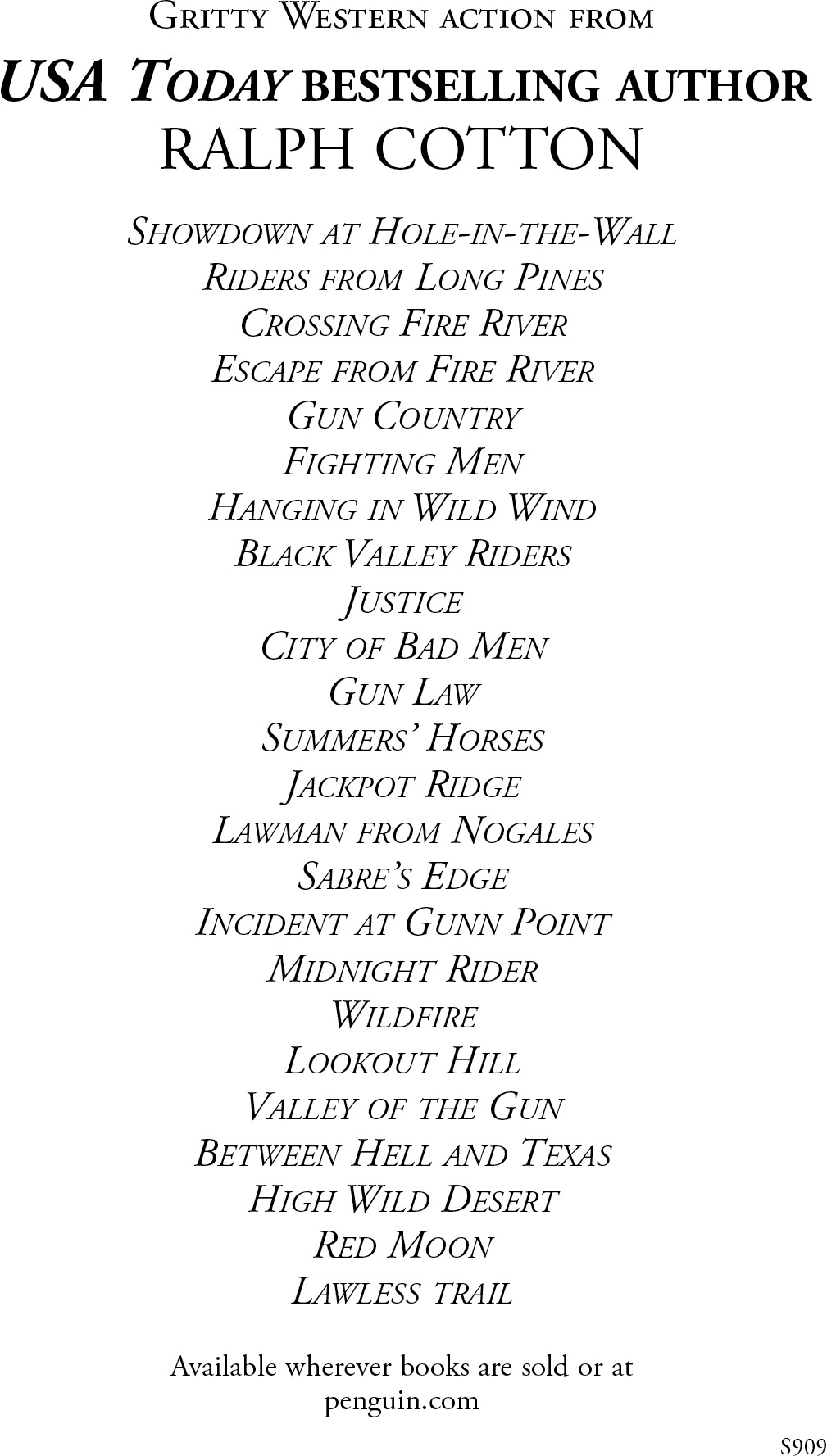Apache Vendetta (16 page)
Authors: Jon Sharpe

The sun was boiling the land alive. Thanks to the heat, the drops had dried within moments of falling. Some were as big around as silver dollars.
Fargo followed them for over a mile. Most men would have long since collapsed. Most whites, anyway. Apaches were hardier, and Cuchillo Colorado was one of the hardiest.
The hills gave way to a maze of boulders and washes.
Fargo had the impression Cuchillo Colorado was searching for something. Maybe a hole to crawl into, or some other spot where his body would never be found.
He was deep in the maze when he came to a flat area about an acre wide. The drops led toward the other side. He was halfway across when, to his consternation, the drops ended.
He stopped and studied the ground ahead and to the right and the left. Nothing. It couldn't be, he told himself. It was almost as if Cuchillo Colorado had bled himself dry. But in that case, he'd be lying there lifeless.
Belatedly, another possibility dawned, and sent a ripple of ice down Fargo's spine.
It could be that Cuchillo Colorado had staunched the flow of blood. Only why wait until now and not do it sooner? The only reason Fargo could think of was that Cuchillo Colorado
wanted
to leave a trail. That the wily Apache expected to be followed and had made it easy until this point.
Until Fargo was out in the open, exposed, as good a target as a man could ask for.
And Cuchillo Colorado had his Colt.
Fargo started to turn even as a gun boomed. His hat went sailing and he felt as he were punched in the head. His legs gave and he fell. He lay still, feigning death while he tried to collect his wits. His left hand was near enough to his head that he could touch it without moving his arm. He was fortunate in that the slug had glanced off. His head hurt like hell and he'd have another scar but he'd live.
Giving silent thanks that Apaches seldom used six-shooters, he heaved up and ran back the way he came. The Colt boomed a second time, but the shot missed. There was time for a third but Cuchillo Colorado didn't try.
Reaching a boulder, Fargo ducked behind it. He was caked with sweat and blood was trickling onto his ear.
Swatting at a fly, he waited to catch his breath.
“You hear me, white-eye?”
The bellow came from a tangle of boulders that could conceal a grizzly.
“I hear you,” Fargo replied, surprised that Cuchillo Colorado would give his position away.
“I almost kill you.”
“You almost did,” Fargo admitted.
“That other one, the one who hurt Corn Flower, he is dead, yes?”
“Yes.”
“Good.”
Fargo studied the tangle, figuring how best to reach it without taking lead.
“White-eye?” Cuchillo Colorado called.
“I'm still here,” Fargo hollered.
“I die soon. You go so I die alone.”
“I have to be sure.”
“You think maybe I lie? You think maybe I live to kill more whites?”
“There's that,” Fargo said, and swore he heard a chuckle.
Silence fell.
Ducking as low as he could go, Fargo moved around the boulder, tensed, and flew to another. The next was too far away to risk running, so he flattened and crawled. He was almost to it when the Colt spanged and lead sent chips flying.
The hot breeze brought another chuckle.
It was unusual, an Apache doing that.
Fargo didn't think anything more of it and continued to work into the tangle. The boulders were in a jumble with some on top of others, and often he had to squeeze through gaps that caused him to lose whangs off his buckskins and more than a little skin.
Twice the Colt cracked, and each time the slug came within a hair of ending his life. And after each shot he heard another of those damnable chuckles.
By Fargo's reckoning Cuchillo Colorado now had only one shot left. Fargo figured he'd wait until he couldn't miss.
A gully offered temporary safety. It also wound toward the spot the shots came from.
As silently as a cougar, Fargo stalked his quarry. He came to the shadow of a giant slab and eased high enough to peer over.
Cuchillo Colorado wasn't five feet away, his back propped against the slab, a grin on his face and the Colt in his lap.
Fargo brought up the Henry but caught himself.
Cuchillo Colorado hadn't moved. His eyes were glazed, and his grin was no such thing. It was a death grimace, an involuntary contortion at the point of dying.
Rising, Fargo went over. He felt for a pulse that wasn't there. Prying the Colt from Cuchillo Colorado's stiffening fingers, he hefted it and thought about the near misses, and wondered. He stared at the body and said, “Damn you.”
It was a simple matter to drag him to the shallow wash but not so simple to find enough small rocks and loose dirt to cover him with.
By the time he was done, Fargo was caked with dust and exhausted to his marrow.
He bent his steps to the basin.
Charity was still beside her brother, awash in despair. She didn't rise to meet him. “Is he . . . ?”
“He is,” Fargo said.
“Will you help me take my brother home to bury him?”
Fargo nodded.
“I wouldn't mind if you stuck around a while. I can use the company. What do you say?”
For once in his life Fargo didn't grin or wink or make a remark about her luscious body. All he did was wearily wipe the sweat from his eyes and say, “Makes two of us.”
LOOKING FORWARD!
The following is the opening
section of the next novel in the exciting
Trailsman series from Signet:
Â
TRAILSMAN #388
BORDERLAND BLOODBATH
Rio Grande borderland, 1860âwhere Skye Fargo witnesses an international land grab and ends up stalked by the most fearsome assassin on the frontier.
Â
The Ovaro gave his low trouble whicker, jolting Skye Fargo out of an uneasy sleep.
In one fluid, continuous movement only a heartbeat after his eyes snapped open, Fargo rolled out of his blanket, rose to a low crouch, shucked his walnut-grip Colt from his holster and thumb-cocked it.
At first, as the last cobwebs of sleep cleared from his mind, all seemed calm enough. Cicadas gave off their metronomic, singsong rhythm; the nearby Rio Grande purled gently only ten yards away; a fat full moon had turned from the buttery color of early evening to the pale white that preceded dawn.
Then Fargo heard it: a man's authoritative voice snapping out an indistinct command from about fifty yards upriver.
The Ovaro snorted, not liking this mysterious human intrusion.
“Steady on, old campaigner,” Fargo said in a low voice, placing a hand on the stallion's neck to calm him. “Whoever they are, they don't know we're here.”
It was 1860, the middle of the blistering dog days in the American Southwest, and the man some called the Trailsman had just finished a three-month stint riding security for a merchant caravan between Santa Fe and Guadalajara, Mexico. He had collected his final pay earlier in El Paso and pitched camp for the night in this juniper thicket on the American side of the sleepy, muddy, meandering river Mexicans called Rio Bravo del Norte, Americans Rio Grande.
Another voice rang out upriver and again Fargo couldn't make out the words. But for some inexplicable reason an ominous sense of foreboding prickled his scalp.
“You picked the wrong campsite, Fargo,” he muttered.
It wasn't just these voices now. Earlier, when Fargo was cleaning and oiling his brass-framed Henry rifle, a lone rider had moved in close, forcing Fargo to kick dirt over his small fire.
Still, such a level of activity was hardly surprising along the U.S.-Mexico border.
Contrabandistas
, slave-trading Comancheros, whiskey peddlers, and gunrunners operated with impunity in this area, and they naturally preferred the cloak of darkness. Whoever they were, Fargo figured it was none of his mix.
Again the commanding voice and this time Fargo thought he had heard the English words “shore it up.”
He moved cautiously forward out of the thicket, unpleasantly aware once again of a vaguely foreboding premonition of danger. Despite the warm night his skin goose-bumped, stiffening the hair on his forearms.
Something's wrong, Fargo
, insisted an urgent inner voice.
Something's dead wrong. Don't you notice what it is?
Fargo emerged silently from the thicket and saw the river reflecting glimmering points of color in the moonlight despite being at its muddiest by late summer. He glanced upriver and spotted torches burning. But he couldn't see much because the black velvet folds of darkness seemed to absorb the illumination before it reached his eyes.
More words reached him now, muffled by the distance and the constant chuckling of the river: “. . . use plenty . . . not too deep . . . more past the bend . . .”
Occasionally he spotted ghostly figures moving in and out of the light. He listened carefully to a steady chunking sound and recognized it as several shovels digging. Men burying contraband, maybe, but why so close to the water?
What's wrong, Fargo?
that insistent inner voice demanded again from some layer of awareness located in survival reflex, not conscious thought.
Figure it out fast, man, before it's too late!
Fargo tucked at the knees beside the river growth and moved slowly closer to the men. Again he reminded himself it was none of his picnic, that he might be edging closer to something immensely dangerous, but intense curiosity had him in its grip.
Fargo realized the shoveling had stopped and suddenly the torches were snuffed. Moments later he heard the rataplan of iron-shod hooves as the men escaped to the north.
But escaping from who?
Not who, Fargo
, urged that body voice deeper than thought.
Escaping from
what
?
Snap into it, Trailsman! Don't you understand what's wrong?
Fargo halted as his mind, honed by years of deadly scrapes and narrow escapes, frantically assembled the baffling clues. The shovels, the sudden escape, the half-formed words he might or might not have heard correctly: “Shore it up . . . use plenty . . . not too deep . . . more past the bend . . .”
And this sudden, throbbing silence . . .
Silence!
“God
damn
,” Fargo abruptly whispered as the important clue he had missed now slammed into him like a fist, something taught to him years ago by an old mountain man: “Watch out, boy, when the insects fall silent.”
Fargo realized what was coming and turned on his heel, bolting back toward the juniper thicket as his stomach turned into a ball of ice. Even as he was about to dive into the thicket the peaceful night was split by blinding light and a cracking boom like the promised doom clap of final reckoning.
The earth split open and heaved flames and dirt in a towering column into the sky. Fargo heard the terrified neighing of the Ovaro and felt a searing ripple of heat as the fire surge washed over him before lifting him into the night and flinging him like a child's toy.
You were too late, Fargo
, was his last thought before his world closed down to pain and darkness and oblivion.
You were just a few seconds too late!


